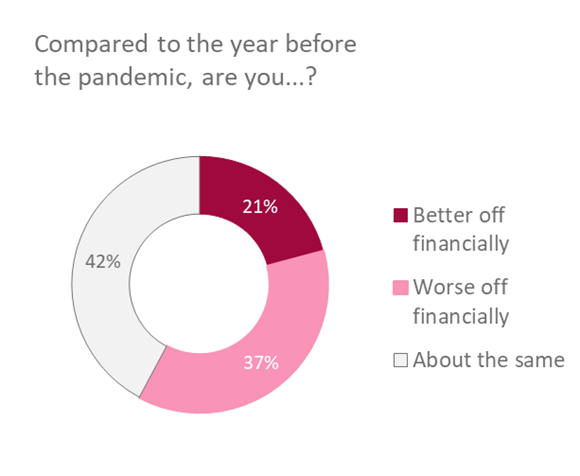The cost of living crisis is starting to impact people's willingness or ability to spend on arts and culture
April 2022
This research is from The Audience Agency's nationwide longitudinal (ongoing) panel survey of changing views about participating in creative and cultural activities through the recent and ongoing crises, and beyond, the Cultural Participation Monitor.
Contents
Themes
The cost of living crisis is emerging as a predictable barrier to engagement, and is particularly likely to affect frequency of attendance (more than spend per attendance - though increased prices would act as a further deterrent).
Groups that are particularly likely to expect to be worse off include:
- those with depression/anxiety (59%),
- those who are neurodiverse (47%),
- those working in 'lower supervisory and technical occupations’ (46%),
- disabled people (45%),
- Frontline Families (44%),
- those with dependent children (42%),
- and those living in the most deprived quartile of areas (40%).

Impact on entertainment and leisure spend
People are split on what they expect to spend on entertainment/leisure, as a third say it will decrease a little/a lot but over a quarter say it will increase.
- Overall, the proportion expecting to spend less is 6 percentage points higher than the proportion expecting to spend more.
- This is lower than the net 16 percentage points who expect to be worse off, suggesting that entertainment/leisure spend may not reduce for as many people as the wider financial situation would imply.

- When those who said that they would reduce spending were asked about how they would do so, over half of people said they will both do things less often and spend less each time (56%).
- Looking at those who said they would either decrease frequency or spend each time, more expected to reduce the former than the latter (25% compared to 12%).
Related videos
Other findings from Wave 6 | Apr 2022 | Shifts, outdoors, working from home, cost of living
-
Willingness to attend events, especially outdoors, is rising
Overall there is much increased willingness to attend events and optimism about future attendance, though some groups continue to be especially concerned, with disabled people less likely to be willing or able to attend.
-
Nearly half of people engaged with arts and culture digitally during the pandemic
Nearly half of people say that they engaged with arts and culture online in some form during the pandemic, weighted towards audiences who are younger, typically high cultural engagers anyway, or disabled.
-
Support for Covid-19 safety measures is starting to ebb
Safety measures are rated as less important than they have been previously, but desire for them continues, with half of audiences still saying that they would not attend if precautions were removed all together.
